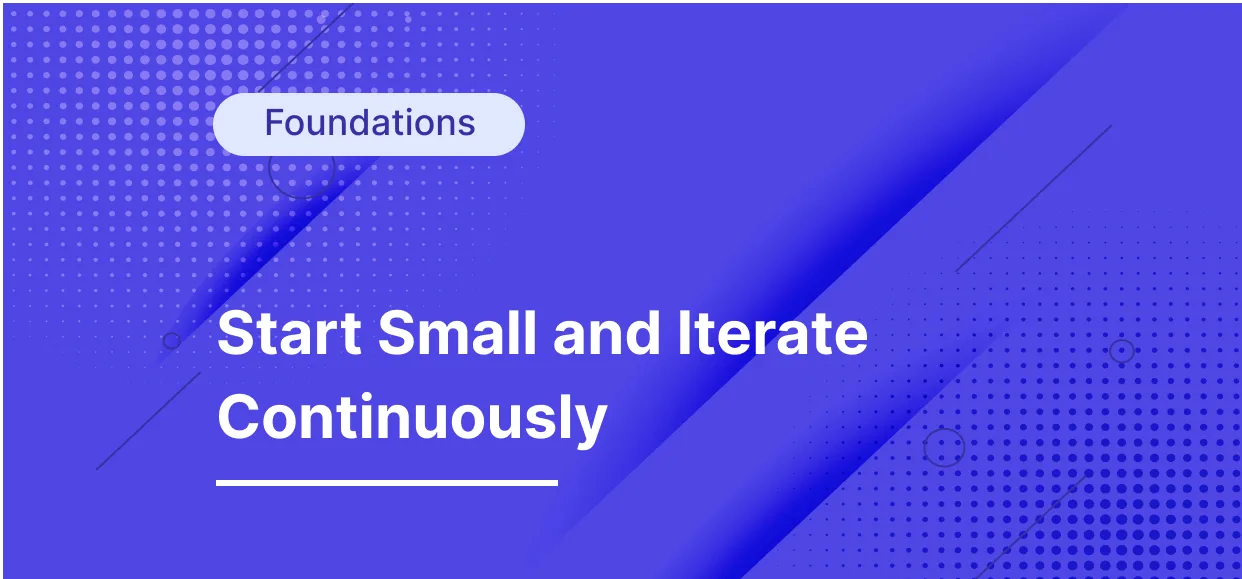- Personalization,
- Experimentation
Start Small and Iterate Continuously to Be Successful in Personalization and Experimentation

In today's competitive business landscape, personalization and experimentation have become essential components of a successful marketing strategy. By tailoring content, offers, and user experiences to individual customer preferences and continuously testing new ideas, companies can drive higher engagement, conversion rates, and customer loyalty.
However, one of the common challenges businesses face with personalization and experimentation is the tendency to try to personalize and test everything on their website at the same time.
This approach often leads to overwhelming complexity, making it difficult for businesses to manage their resources effectively and measure the impact of their efforts.
In this playbook, we will
👉 explore the benefits of starting small and iterating continuously in personalization and experimentation
👉 provide a roadmap for businesses to overcome this challenge and achieve success in their marketing initiatives
The Power of Starting Small
Benefits of Starting Small
Lower Risk
By focusing on smaller, more manageable personalization and experimentation projects, businesses can significantly reduce the risks associated with implementing new strategies.
Instead of investing substantial time, effort, and resources into a large-scale initiative that may not yield the desired results, starting small allows companies to test the waters and evaluate the effectiveness of their personalization and experimentation efforts without risking major setbacks.
This approach also enables businesses to identify potential issues early on and make necessary adjustments before scaling up their efforts.
Easier to Manage and Control
Smaller personalization and experimentation projects are inherently easier to manage and control.
With fewer variables to consider and less complexity involved, businesses can maintain better oversight of their initiatives, ensuring that they stay on track and aligned with their overall marketing objectives.
This streamlined approach not only makes it easier for teams to collaborate and coordinate their efforts but also helps prevent potential missteps or wasted resources due to miscommunication or lack of clarity.
Faster Feedback Loop
Starting small enables businesses to collect feedback and analyze the results of their personalization and experimentation efforts more quickly.
By implementing small-scale tests and gathering data on customer engagement, businesses can gain valuable insights into what works and what doesn't in a shorter timeframe. This faster feedback loop allows companies to iterate and adapt their strategies more rapidly, leading to continuous improvement and, ultimately, better performance.
Additionally, this quicker turnaround can help maintain momentum and motivation within the team, as they see the fruits of their labor sooner rather than later.
The Iterative Approach
What Is an Iterative Approach?
An iterative approach is a method of problem-solving, development, or improvement in which a process is repeated in cycles with the aim of refining and optimizing the outcome.
In the context of personalization and experimentation, an iterative approach involves continuously testing, analyzing, learning, and adapting marketing strategies based on data-driven insights and customer feedback.
Instead of attempting to create a perfect solution or strategy from the outset, the iterative approach acknowledges that there will always be room for improvement. By breaking down complex tasks into smaller, manageable increments, businesses can gradually refine their strategies through a series of iterations, each one building upon the learnings and insights gained from previous cycles.
This approach enables companies to be more agile and responsive to changing customer preferences, market conditions, and competitive landscapes. It promotes continuous learning and improvement, allowing businesses to stay ahead of the curve and achieve better results in their personalization and experimentation efforts over time.
Why Is It Important to Iterate Continuously?
Continuous Improvement
By adopting an iterative approach, businesses can foster a culture of continuous improvement.
With each iteration, companies can learn from their previous efforts, identify areas of potential optimization, and implement changes based on data-driven insights.
This process of constant refinement enables businesses to incrementally improve their personalization and experimentation strategies, ultimately leading to better engagement, higher conversion rates, and improved customer satisfaction.
Adapting to Changing Customer Preferences
Customer preferences and behaviors are constantly evolving due to factors such as advancements in technology, market trends, and shifting cultural values.
To stay relevant and cater to the needs of their audience, businesses must be agile and responsive to these changes.
By iterating continuously, companies can quickly adapt their personalization and experimentation strategies based on real-time feedback and emerging trends, ensuring that they are always meeting the needs of their customers and providing the best possible experience.
Staying Ahead of the Competition
In today's highly competitive business landscape, staying ahead of the competition is more important than ever.
An iterative approach to personalization and experimentation allows businesses to keep pace with – or even outperform – their competitors by continually refining their strategies and discovering innovative ways to engage and delight their customers.
By being proactive in identifying and capitalizing on opportunities for improvement, businesses can maintain a competitive edge and drive long-term success in their respective markets.
Steps to Implement an Iterative Approach
Define Goals and Objectives
Before initiating any personalization or experimentation efforts, it's crucial to establish clear goals and objectives.
These should be aligned with the overall business and marketing strategy and should be specific, measurable, attainable, relevant, and time-bound (SMART).
By defining goals and objectives upfront, businesses can ensure that their iterative efforts are focused on achieving meaningful outcomes and driving real value for the organization.
Test and Analyze
Once goals and objectives have been established, businesses can begin testing various personalization and experimentation ideas.
This process may involve A/B testing, multivariate testing, or other forms of experimentation designed to measure the impact of different strategies on customer engagement, conversion rates, or other key performance indicators (KPIs).
As tests are conducted, it's essential to collect and analyze data to gain insights into what works and what doesn't. This analysis should be thorough and objective, taking into account both quantitative and qualitative feedback.
Learn and Adapt
After analyzing the results of the tests, businesses should use the insights gained to inform their next steps. This may involve making adjustments to existing personalization or experimentation strategies, discarding ineffective tactics, or scaling up successful initiatives.
By learning from the outcomes of each iteration and adapting their approach accordingly, companies can continuously refine their personalization and experimentation efforts, leading to better results over time.
It's important to remember that this is an ongoing process, and businesses should always be prepared to iterate and adapt as new information emerges or circumstances change.
The Bottom Line
In summary, starting small and iterating continuously are essential principles for success in personalization and experimentation.
By focusing on manageable projects and refining strategies through an iterative approach, businesses can overcome common challenges associated with large-scale initiatives, reduce risks, and optimize their marketing efforts more effectively.
This process enables companies to
🚀 adapt to changing customer preferences,
🚀 stay ahead of the competition, and
🚀 ultimately achieve better results.
As you embark on your personalization and experimentation journey, remember that taking the first step is crucial. Embrace a growth mindset and be prepared to learn, adapt, and evolve your strategies over time. By doing so, you'll be better equipped to navigate the complexities of today's dynamic business environment and drive long-term success for your organization.
Get in touch to learn how Ninetailed personalization, experimentation, and insights works inside your CMS

![4 Benefits of Headless A/B Testing [with Examples from Ace & Tate]](https://images.ctfassets.net/a7v91okrwwe3/1rAE9Eod5ybWUHtc9LEMLo/607bdcaf0512ec8f2af0f9f93dbe84f8/Ace___Tate_landscape.jpg?fm=webp&q=75&w=3840)